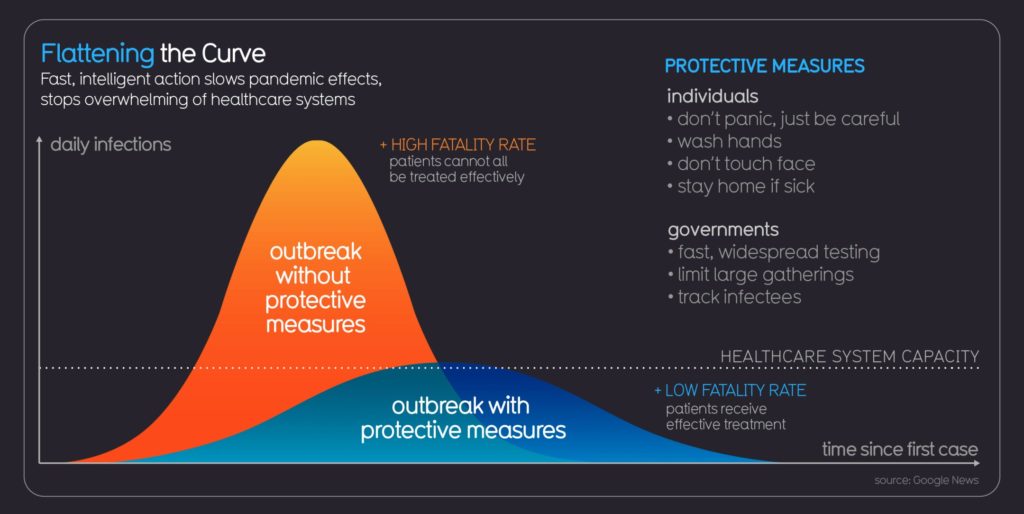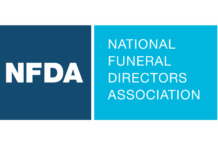Resources and best practices for funeral services during the COVID-19 epidemic.
By Leader Contributors Tracie Martin and Linnea Crowther of Legacy.com
The COVID-19 pandemic is having a ripple effect on business operations throughout the economy, and the funeral industry is no exception. With health directives about group gatherings changing by the hour, families and funeral directors are faced with uncertainty and tough decisions about whether or not to delay memorial gatherings.
It’s an uncertain time, but we’ve got some answers to help you guide your families on the right choice for a funeral service.
Why is it important to handle funeral services differently right now?
You’ve undoubtedly heard the phrase “flattening the curve” a lot this past week. As the graph below shows, the nationwide virus mitigation strategy depends on slowing the rate of spread to keep demand from overwhelming the US healthcare system:

In other words, the more people practice strong hygiene habits and limit physical contact, the slower the virus infects others, and the greater our pool of available medical resources. This means that someone who needs a ventilator to survive will get one. But if cases spike, chances are, they won’t.
This gives every small precaution we take, in every community, the power to drop that curve closer to the safety zone.
Can we still hold regular funeral services?
According to the NFDA and CDC for now, yes, you can, but there are two areas of potential risk.
First, at any funeral, there is the risk of contagion from funeral attendees. This is addressed at greater length below.
Second, at a funeral for someone who died of COVID-19, there are concerns about contact with the body. The National Funeral Directors Association writes in their COVID-19 resource center:
“At this time, CDC guidance states, ‘There is currently no known risk associated with being in the same room at a funeral or visitation service with the body of someone who died of COVID-19.’ However, the CDC also notes, ‘People should consider not touching the body of someone who has died of COVID-19.’”
What are the accepted best safety practices?
1. Fewer hugs and handshakes, and a lot of sanitizing. Industry experts agree that, for now, the best way to lower the risk of transmitting the virus at a funeral gathering, or in your arrangement room, is to discourage physical touching, encourage good hygiene, and keep your facilities as clean as possible. Here are some recommendations from the NFDA:
- Remind families about how to prevent the spread of COVID-19, such as by staying home if you are sick, washing your hands, and covering coughs and sneezes. The CDC has great informational flyers, such as “How to Stop The Spread of Germs,” you can post in your funeral home or hand out to families.
- Keep soap dispensers filled in public (and employee) restrooms.
- The CDC has several informational flyers on handwashing you can post in public and staff restrooms.
- Offer alcohol-based hand sanitizer that contains at least 60% alcohol to guests (and employees).
- Have extra tissues on hand.
- As a business open to the public, it’s important that you and your staff be vigilant about cleaning, especially after services or arrangement conferences. The CDC offers guidance for businesses – including recommendations on cleaning products – on cleaning facilities open to the public.
National Funeral Directors Association, Situation Update: Novel Coronavirus (COVID-19)
2. Ask your families about their health.
Finding out some basic exposure history from your families during the arrangement process can also go a long way to helping mitigate risk and drive safer memorial choices.
Bob Gordon, funeral director at Cypress Lawn Funeral Home & Memorial Garden in Colma, California, says: “When we’re talking to families, we ask the questions just to get it out in the open: Has anyone been traveling abroad in your family? Do you have any family members that may be at risk to come to a group event? It’s the right thing to do.”
What should we recommend to families?
1. Funerals are important.
We spoke with multiple funeral directors and the NFDA, and everyone agrees on one thing: memorial services are important, and we still need to hold them.
“The gathering is really the important part about the funeral ceremony, because you feel the support of your community around you,” says Walker Posey, a funeral director at Posey Funeral Directors in North Augusta, South Carolina and spokesman for the NFDA. “Whether it’s large or small, families need to feel supported by their communities.”
Bruce Likly of the funeral-livestreaming company TribuCast agrees: “People go to funerals clearly in pain, and as they go through the process of congregating with loved ones, and share stories and religion as appropriate, they come out the other end transformed.”
2. But funerals can be held differently
There are a number of different ways for people to honor their loved ones that will minimize the possibility of virus transmission. Postponing services is one option. Outdoor services combined with some of the sensible best practices outlined above can be a good choice in warmer areas of the country.
But the most flexible, most popular option is the remote service.
What are remote or online funeral services and how can I hold them?
Even before COVID-19, funeral directors had begun turning to digital options for memorial gatherings.
Companies like TribuCast and Viewlogies provide technology to stream funerals online, with options for friends and family to watch the funeral remotely on their own devices — and to participate, too. Live chat can be included for anyone who may not have a webcam at home but still wants to be actively involved in the funeral service. Multimedia offerings can be provided to remote attendees, including the funeral program, written eulogy, and family photos and videos.
Most streaming software is easy and quick to set up — Likly notes that, for TribuCast, the funeral home simply needs to download two pieces of free software, and the TribuCast website will walk them through getting started. But your funeral home may also consider helping families take a more do-it-yourself short-term approach. A well-placed device with a webcam can provide simple video and audio of those who are speaking at a memorial service, and remote mourners can view what’s happening using a common videoconferencing app like Google Hangouts or Zoom.
Early adopters of digital funeral services are highly enthusiastic about the benefits, both for families and the industry. “You think about how this process of healing from loss, celebrating life, and saying goodbye is reaching out and touching people that aren’t even on our premises,” says Gordon. “It’s just a good thing for funeral service — a good thing, in my opinion, for helping people heal.”
What’s Next?
We’re keeping a close eye on industry trends and resources that will help your families remember their loved ones safely. Click here to get the latest news and tips, or visit https://new.legacy.com/news-and-resources/
More Info & Resources
- NFDA’s COVID-19 information page
- CDC’s FAQ page, including info for funeral directors
- CDC’s prevention page
- Veterans Affairs National Cemetery Administration page
- Funerals during COVID-19: a guide for families








